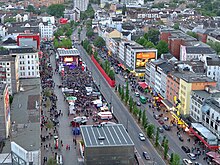Reeperbahn

Reeperbahn (right) passing Spielbudenplatz
|
|
| Length | 930 m |
|---|---|
| Location |
St. Pauli, Hamburg, Germany |
| Postal code | 20359, 22767 |
| Nearest metro station |
|
| Coordinates | 53°32′58″N 9°57′44″E / 53.54944°N 9.96222°E |
| Millerntor end | Millerntorplatz |
| Major junctions |
Davidstraße, Große Freiheit |
| Nobistor end | Holstenstraße |
| Other | |
| Known for | night life, prostitution |
The Reeperbahn (German pronunciation: [ˈʀeːpɐˌbaːn]) is a street and entertainment district in Hamburg's St. Pauli district, one of the two centres of Hamburg's nightlife (with Schanze) and also the city's major red-light district. In German it is also called die sündigste Meile (the most sinful mile) and nicknamed Kiez. The Reeperbahn Festival is among the largest club festivals.
The name Reeperbahn means ropewalk, which is a place where ropes are made (Low German Reep = rope, the standard German word is Seil; Bahn= track). Until the 1620s Hamburg's ropewalks had been located in the Neustadt (New Town) quarter of the inner city close to the Elbe, which then became a densely built up area. Therefore, the ropewalks "had to be relocated outside the city walls on the country road leading toward Altona – which later took on the street name 'Reperbahn'." The street was a ropewalk in the 17th and 18th centuries.
The street is lined with restaurants, night clubs, discotheques and bars. There are also strip clubs, sex shops, brothels, a sex museum and similar businesses.
The Operettenhaus, a musical theatre, is also located at the Reeperbahn. It played Andrew Lloyd Webber's Cats for many years, after that Mamma Mia!, an ABBA-musical, followed by "Ich war noch niemals in New York", ("I have never been to New York") featuring hit songs by Austrian singer/songwriter Udo Jürgens, then Sister Act and finally Rocky, based on the Stallone film. There are other theatres at the Reeperbahn (St. Pauli Theater, Imperial Theater, Schmidt's Tivoli) and also several Cabarets/Varietés.
...
Wikipedia
